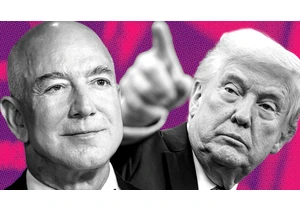TikTok on Thursday pushed back against U.S. government arguments that the popular social media platform is not shielded by the First Amendment, comparing its platform to prominent American media organizations owned by foreign entities.
Last month, the Justice Department argued in a legal brief filed in a Washington federal appeals court that neither TikTok’s China-based parent company, ByteDance, nor the platform’s global and U.S. arms — TikTok Ltd. and TikTok Inc. — were entitled to First Amendment protections because they are “foreign organizations operating abroad” or owned by one.
TikTok attorneys have made the First Amendment a key part of their legal challenge to the federal law requiring ByteDance to sell TikTok to an approved buyer or face a ban.
On Thursday, they argued in a court document that TikTok’s U.S. arm doesn’t forfeit its constitutional rights because it is owned by a foreign entity. They drew a parallel between TikTok and well-known news outlets such as Politico and Business Insider, both of which are owned by German publisher Axel Springer SE. They also cited Fortune, a business magazine owned by Thai businessman Chatchaval Jiaravanon.
“Surely the American companies that publish Politico, Fortune, and Business Insider do not lose First Amendment protection because they have foreign ownership,” the TikTok attorneys wrote, arguing that “no precedent” supports what they called “the government’s dramatic rewriting of what counts as protected speech.”
In a redacted court filing made last month, the Justice Department argued ByteDance and TikTok haven’t raised valid free speech claims in their challenge against the law, saying the measure addresses national security concerns about TikTok’s ownership without targeting protected speech.
The Biden administration and TikTok had held talks in recent years aimed at resolving the government’s concerns. But the two sides failed to reach a deal.
TikTok said the government essentially walked away from the negotiating table after it proposed a 90-page agreement that detailed how the company planned to address concerns about the app while still maintaining ties with ByteDance.
However, the Justice Department has said TikTok’s proposal “failed to create sufficient separation between the company’s U.S. operations and China” and did not adequately address some of the government’s concerns.
The government has pointed to some data transfers between TikTok employees and ByteDance engineers in China as why it believed the proposal, called Project Texas, was not sufficient to guard against national security concerns. Federal officials have also argued that the size and scope of TikTok would have made it impossible to meaningfully enforce compliance with the proposal.
TikTok attorneys said Thursday that some of what the government views as inadequacies of the agreement were never raised during the negotiations.
Separately the DOJ on Thursday evening asked the court to submit evidence under seal, saying in a filing that the case contained information classified at “Top Secret” levels. TikTok has been opposing those requests.
Oral arguments in the case are scheduled to begin on Sept. 16.
—Haleluya Hadero, AP Business Writer
Login to add comment
Other posts in this group

As artificial intelligence gets smarter, a growing number of companies are increasing its implementation in their operations or more heavily promoting their own AI offerings. The buzzword for this

Consumers are only just starting to feel pain from Trump’s Liberation Day tariff spree. Amazon

When Donald Trump returned to the White House in 2025, many in the tech world hoped his promises to champion artificial intelligence and cut regulation would outweigh the risks of his famously vol

The first 27 satellites for Amazon’s Kuiper broadband internet constellation were launched into space from Florid

There are so many ways to die. You could fall off a cliff. A monk could light you on fire. A bat the size of a yacht could kick your head in. You’ve only just begun the game, and yet here you are,

Former Tinder CEO Renate Nyborg launched Meeno less than two years ago with the intention of it being an AI chatbot that help

The most indelible image from Donald Trump’s inauguration in January is not the image of the president taking the oath of office without his hand on the Bible. It is not the image of the First Lad
